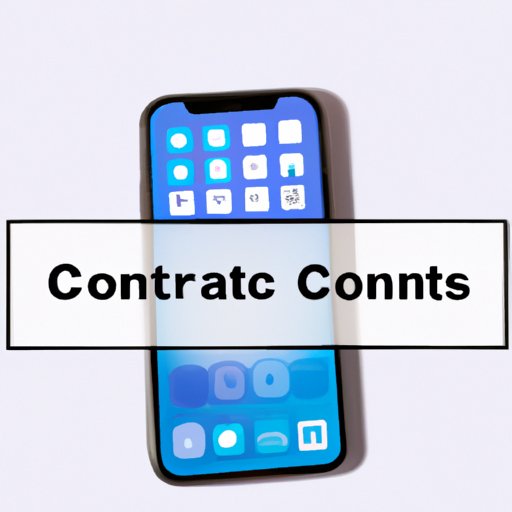
Introduction
Our phones are often integral to our daily lives, from staying in touch with loved ones to getting work done on the go. However, there are times when we receive unwanted calls or messages from certain contacts, causing unnecessary distractions and even stress. Fortunately, with an iPhone, you can easily block contacts who are bothering you. In this article, we’ll provide a step-by-step guide along with some advanced tips and scenarios for blocking contacts on your iPhone.
Step-by-Step Guide to Blocking Contacts on Your iPhone
First, it’s important to know that there are two ways to block contacts on your iPhone: through the Phone app or through the Messages app. Here’s how to do it.
Blocking a contact through the Phone app:
- Open the Phone app and go to the “Recents” tab
- Find the contact you want to block and tap the “i” icon next to their name
- Scroll down and tap “Block this Caller”
- Confirm by tapping “Block Contact”
Blocking a contact through the Messages app:
- Open the Messages app and find a conversation with the contact you want to block
- Tap the contact’s name or number at the top of the screen
- Tap the “i” icon next to their name or number
- Scroll down and tap “Block this Caller”
- Confirm by tapping “Block Contact”
That’s it! The contact will no longer be able to call, message, or FaceTime you.
Why Blocking Contacts is Important and How to Do It Quickly on Your iPhone
Blocking contacts can be important for a number of reasons, such as dealing with spam or harassment. iPhone also allows you to quickly block a contact through a few shortcuts:
- Opening a recent call or message from the contact and tapping the “i” icon, then selecting “Block this Caller”
- Asking Siri to “block [contact’s name]”
- Adding a phone number to your blocked list by going to Settings > Phone > Blocked Contacts, and tapping “Add New”
By utilizing these shortcuts, you can quickly block any contact that’s bothering you without having to manually navigate through the Phone or Messages app.
Advanced Tips for Blocking Contacts on Your iPhone
For iPhone users who are already familiar with the basics, there are additional tips for managing blocked contacts. Here are some advanced tips:
- Use custom rules to block calls from all unknown or hidden numbers
- Create custom contact groups to block entire groups of people at once (more on this later)
- Automate the process of blocking contacts by using third-party apps or shortcuts
These tips are especially useful for those who receive a lot of unwanted calls or messages, as they can help streamline the process of blocking contacts on your iPhone.
The Pros and Cons of Blocking Contacts on Your iPhone
While blocking a contact can be a useful tool for managing phone calls and messages, there are some potential drawbacks to consider as well. Here are some pros and cons:
Pros:
- Prevents you from receiving unwanted calls, messages, and FaceTime requests from a specific contact
- Can help reduce stress and maintain boundaries
- Allows you to focus on important tasks without distractions
Cons:
- The contact will know that they are blocked, which may create additional conflict
- Blocking someone may not address the root of the problem
- You may miss important calls or messages from the contact in the future
Before blocking a contact, it’s important to weigh the pros and cons and consider whether there are alternative solutions to the problem at hand.
Simplifying Your Life: How to Block all Unwanted Contacts on Your iPhone
Blocking individual contacts one by one can be time-consuming, especially if you receive lots of unwanted calls or messages. Fortunately, there are ways to block multiple contacts at once or block entire groups of people. Here’s how:
Using custom contact groups:
- Go to the Contacts app and tap the “+” icon in the top right corner to create a new contact group
- Add the contacts you want to block to this new group
- Go to Settings > Phone > Blocked Contacts and tap “Add New”
- Select the new contact group you just created, and all contacts in that group will now be blocked
Using third-party apps:
There are many third-party apps available for download that can help you block multiple contacts at once. Some popular ones include Truecaller, Mr. Number, and Hiya. These apps allow you to block entire groups of people with just a few clicks.
By using these methods, you can effectively block all unwanted contacts on your iPhone without having to spend a lot of time and effort blocking each person individually.
Teaching the Kids to Block Contacts on Their iPhones: A Parent’s Guide
If you’re a parent, you may be concerned about your child’s phone use and want to teach them how to block unwanted contacts on their own. Here are some tips:
- Show them how to block contacts through the Phone or Messages app (see step-by-step guide above)
- Explain the importance of not sharing personal information with strangers online or over the phone
- Set parental restrictions on their iPhone to limit their access to certain features or apps
- Monitor their phone use and talk to them about any concerning calls or messages they receive
By guiding your child on how to block contacts and setting proper restrictions on their phone use, you’ll be helping them stay safe and responsible online.
Conclusion
Blocking unwanted contacts on your iPhone can be a helpful tool for managing distractions and maintaining boundaries in your personal and professional life. By following this comprehensive guide, you’ll have all the tools you need to effectively block contacts on your iPhone.




